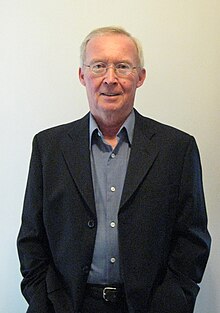William Hare (philosopher)
William Francis Hare | |
|---|---|
 | |
| Born | February 7, 1944 |
| Era | 20th-century philosophy |
| Region | Western Philosophy |
Main interests | Philosophy of Education |
William Hare (born February 7, 1944, Leicester, UK) is a philosopher whose writings deal primarily with problems in philosophy of education. He attended Wyggeston Grammar School for Boys, 1955–62. After receiving his B.A. from the University of London (1965), he gained an M.A. in philosophy from the University of Leicester (1968), and a Ph.D. in educational theory from the University of Toronto (1971). He was Professor of Education and Philosophy at Dalhousie University from 1970–95, and subsequently Professor of Education at Mount Saint Vincent University until his retirement in June 2008. He is now Professor Emeritus. He is known mainly for his work on open-mindedness, and has published several papers dealing with philosophical ideas about education in the work of Bertrand Russell.[1]
External links
Selected books
- Open-mindedness and Education (1979)
- In Defence of Open-mindedness (1985)
- What Makes a Good Teacher (1993)
Edited works
- Philosophy of Education: Introductory Readings (1988, 1996, 2001)
- Key Questions For Educators (2005)
- These two collections are co-edited with John P. Portelli.
Publications
- Hare, W.F. (2009). "Socratic open-mindedness". Paideusis. 18 (1): 5–16.
{{cite journal}}: Unknown parameter|authormask=ignored (|author-mask=suggested) (help) - Hare, W.F. (2009). "What open-mindedness requires". Skeptical Inquirer. 33 (1): 36–39.
{{cite journal}}: Unknown parameter|authormask=ignored (|author-mask=suggested) (help) - Hare, W.F. (2007). Cohen, Elliot D (ed.). "Why philosophy for educators?". International Journal of Applied Philosophy. 21 (2): 149–59. doi:10.5840/ijap20072122.
{{cite journal}}: Unknown parameter|authormask=ignored (|author-mask=suggested) (help) - Hare, W.F. (2007). "Credibility and credulity: Monitoring teachers for trustworthiness". Journal of Philosophy of Education. 41 (2): 207–19. doi:10.1111/j.1467-9752.2007.00557.x.
{{cite journal}}: Unknown parameter|authormask=ignored (|author-mask=suggested) (help) - Hare, W.F. (2006). "Why open-mindedness matters". Think. 13 (13): 7–15. doi:10.1017/S1477175600001482.
{{cite journal}}: Unknown parameter|authormask=ignored (|author-mask=suggested) (help) - Hare, W.F. (2004). "Assessing one's own open-mindedness". Philosophy Now. 47: 26–28.
{{cite journal}}: Unknown parameter|authormask=ignored (|author-mask=suggested) (help) - Hare, W.F. (2003). Cohen, Elliot D (ed.). "Is it good to be open-minded?". International Journal of Applied Philosophy. 17 (1): 73–87. doi:10.5840/ijap20031718.
{{cite journal}}: Unknown parameter|authormask=ignored (|author-mask=suggested) (help) - Hare, W.F. (2001). "Bertrand Russell and the ideal of critical receptiveness". Skeptical Inquirer. 25 (3): 40–44.
{{cite journal}}: Unknown parameter|authormask=ignored (|author-mask=suggested) (help)
References
- ^ Talaska, Richard A. (1992). Critical Reasoning in Contemporary Culture. SUNY Press. pp. 112–. ISBN 9780791409794. Retrieved 5 August 2012.
